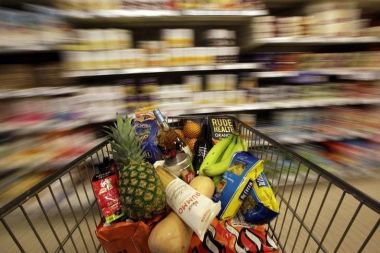Brits are spending more on restaurants and holidays as recovery takes hold

British consumers finally look ready to spend like they used to, as lower prices for basics give them more money to eat out and travel, bolstering the economy against weak demand from abroad.
High inflation, meagre wage rises and increased unemployment curbed spending long after the recession ended in 2009. Last year, Britons still spent less on day-to-day items than before the financial crisis, when adjusted for inflation and a growing population.
That represents a far longer squeeze than after previous recessions, and recovery to pre-crisis levels of spending is likely to take until next year.
However there are signs that spending is gathering pace as pay picks up and after a global slump in oil and food prices pushed British inflation to a 55-year low.
Last month the Bank of England forecast that spending would rise by 2.75 per cent in real terms this year, the fastest rate in a decade. Consumers account for almost two thirds of British spending, more than in any other big advanced economy apart from the United States.
Visa Europe says consumer spending last month was 2.6 per cent higher than a year ago, after the strongest three months of growth since late 2008.
At a large shopping centre in east London last week, the mood was upbeat. "I am spending more as my business is doing well," said Rachel, 48, who had bought a new pair of trainers for her son.
Rachel, who sells clothes and jewellery online, and declined to give her surname, visits the centre up to four times a week for its cinema and restaurants as well as its shops.
That is typical, said Clive Black, a retail expert at investment group Shore Capital. "The 'affordable treat' element of living in the last five years has provided a base for structural change," he said.
Some 35 per cent of Britons' calories come from food eaten out, compared with 30 per cent before the crisis. Black expects this to rise eventually towards the US level of 50 per cent.
For the big supermarkets, this means the recession has not ended. Black said thrifty food shopping habits acquired during the financial crisis had stuck.
Instead, "people are buying more televisions, they're buying more cars, they're going on better holidays and we see people eating out rather than eating in", Sainsbury's chief executive Mike Coupe said after the supermarket announced its first loss in a decade last month.
Market research company Nielsen said British shoppers' willingness to spend on holidays and home improvements had risen more over the past year than their US, German or French peers.
UNBALANCED RECOVERY?
But such habits, albeit combined with poor returns on overseas investments, helped take Britain's current account deficit with the rest of the world to a record high last year.
"We still have desire from consumers to import a lot of goods from abroad," said Paul Smith, an economist at financial services company Markit who compiles the Visa data.
Consumer lending is rising at its fastest rate since 2007, the Bank of England said last week.
"The real issue will be when interest rates are tightened again," Smith said. Most economists expect the central bank to start to gradually raise interest rates from their record-low 0.5 per cent next year.
Unsecured borrowing, which is typically used to fund consumer spending, is also forecast to rise steadily as a share of income over the coming years as households ease off on paying down debts, the government's budget watchdog predicts.
But a consumer-led recovery may be the lesser of two evils, given lack of demand for British exports in much of the euro zone, Britain's largest trading partner.
Stronger wage growth, rising house prices and past prudence mean households have scope to spend more for several years to come, Michael Saunders, chief UK economist at Citi, said.
Moreover, Britain could fund its current account gap because returns for investors are higher than elsewhere in Europe, he said.
Catching up on the ground lost since the financial crisis was more urgent than seeking the best economic mix between consumption, investment and exports.
"The UK's options are either to have unbalanced growth, or grow no faster than the euro area," Saunders said.











